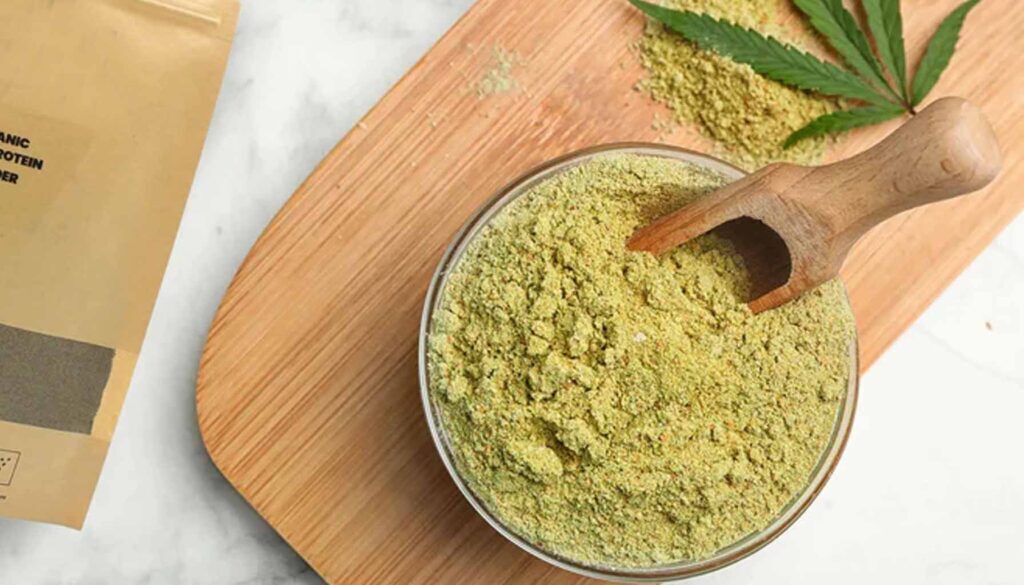Hemp Protein: A Comprehensive Look at a Sustainable Superfood
Hemp Protein: Discover a Sustainable Superfood with Complete Nutrition, Environmental Benefits, and a Growing Market – Dive In Today!
Introduction
Hemp protein, derived from hemp plant seeds, is rapidly gaining popularity in the plant-based protein sector. Its appeal lies not just in its comprehensive nutritional profile, which includes a rich array of essential amino acids, fibers, and a balance of omega fatty acids, but also in its environmentally sustainable cultivation methods. These attributes are making hemp protein increasingly attractive to both health-conscious individuals and those concerned about environmental sustainability. Its emergence in the market signals a shift in consumer preferences towards more eco-friendly and health-oriented dietary choices.
Nutritional Profile
The nutritional profile of hemp protein is remarkable for its completeness and balance. It is especially notable for its richness in essential amino acids, making it a complete protein source – a rarity in the plant-based protein world. In addition to its protein content, hemp protein is high in dietary fiber, which aids in digestion and contributes to overall gut health. Furthermore, it offers a healthy balance of omega-3 and omega-6 fatty acids, essential for heart health and reducing inflammation. This combination of nutrients makes hemp protein a highly beneficial addition to a balanced diet, appealing to those seeking both health and nutritional benefits from their food sources.
Health Benefits
The health benefits of hemp protein are diverse and significant. It aids in muscle repair, making it an excellent supplement for athletes and those engaged in physical activities. Hemp protein’s positive impact on heart health is attributed to its balance of omega-3 and omega-6 fatty acids, which are known for reducing heart disease risks. Additionally, its high fiber content supports digestive health, promoting regularity and gut health. Being plant-based, hemp protein is a perfect protein source for vegetarians and vegans, offering an animal-free path to obtaining essential nutrients.
Environmental Impact
Hemp cultivation stands as a shining example of sustainable agricultural practices, leaving a minimal environmental footprint compared to many other crops used for protein production. Here’s a closer look at why hemp is an eco-friendly choice:
- Water Efficiency: Hemp is a remarkably water-efficient crop. Unlike water-intensive crops such as soy or almonds, hemp thrives with substantially less water. This characteristic not only conserves a precious natural resource but also reduces the strain on water supplies in regions facing water scarcity.
- Pesticide-Free Farming: One of the remarkable aspects of hemp cultivation is its natural resilience to pests and diseases. Hemp plants have evolved with built-in pest-resistant mechanisms, which significantly reduces the need for chemical pesticides. This, in turn, prevents the contamination of soil and water with harmful chemicals, contributing to overall environmental health.
- Soil Regeneration: Hemp has a unique ability to improve soil quality. Its extensive root system helps prevent soil erosion and compaction, while the plant itself absorbs carbon dioxide during its growth. This process contributes to soil regeneration and carbon sequestration, making hemp cultivation a positive force in combating climate change.
- Biodiversity Preservation: Hemp fields provide a habitat for a variety of beneficial insects and wildlife. By avoiding the use of pesticides and fostering biodiversity, hemp cultivation helps maintain a healthier ecosystem, promoting the well-being of both plants and animals.
- Sustainable Crop Rotation: Hemp’s versatility extends to its role in crop rotation. It can be used as a valuable rotational crop with other agricultural staples, aiding in the reduction of soil depletion and increasing overall agricultural sustainability.
In summary, hemp’s minimal water requirements, pesticide-free farming practices, soil-regenerating properties, support for biodiversity, and its role in sustainable crop rotation make it a standout choice for those concerned about the environment. Choosing hemp protein as a dietary staple not only benefits your health but also contributes to a greener, more sustainable future.
Culinary Uses
Hemp protein’s delightful nutty flavor and exceptional nutritional profile make it a valuable ingredient in the culinary world. Its versatility opens up a wide range of creative possibilities in the kitchen, allowing you to enhance both the taste and nutritional value of your dishes. Here are some exciting ways to incorporate hemp protein into your meals:
- Smoothies: Hemp protein powder seamlessly blends into smoothies, enhancing their creaminess and providing a protein-packed boost. Combine it with your favorite fruits, vegetables, yogurt, or plant-based milk for a quick and nutritious breakfast or post-workout refresher.
- Baked Goods: Hemp protein can be an excellent addition to baked goods like muffins, pancakes, and cookies. Its nutty undertones complement the flavors of various recipes while adding a protein-rich element. You can replace a portion of traditional flour with hemp protein to boost the nutritional content of your treats.
- Protein Bars: Create your own homemade protein bars by mixing hemp protein with ingredients like oats, nuts, seeds, and honey or nut butter. These bars make for convenient, on-the-go snacks that provide sustained energy and protein.
- Salad Toppings: Sprinkle hemp protein on salads for an extra crunch and a protein punch. The nutty texture and flavor add a delightful dimension to your greens, transforming a simple salad into a satisfying and nutritious meal.
- Smoothie Bowls: Build nourishing smoothie bowls with hemp protein as a central ingredient. Top them with an assortment of fresh fruits, nuts, seeds, and a drizzle of honey for a visually appealing and wholesome breakfast or snack.
- Savory Dishes: Don’t limit hemp protein to sweet dishes; it can also enhance savory recipes. Incorporate it into soups, stews, or sauces to thicken and enrich the texture while providing an extra dose of plant-based protein.
- Yogurt and Cereal: Stir hemp protein into your morning yogurt or cereal for added creaminess and a protein boost. It combines well with granola, berries, and honey for a balanced and satisfying breakfast.
- Nutritional Boost: When you’re looking to increase the protein content of your favorite recipes, such as oatmeal, chia pudding, or even mashed potatoes, simply mix in hemp protein for added nutrition without compromising taste.
Incorporating hemp protein into your culinary repertoire not only elevates the flavor and texture of your dishes but also enriches them with a valuable source of complete plant-based protein, essential amino acids, and healthy fats. Its adaptability in both sweet and savory creations makes it an exciting and nutritious addition to your kitchen.
Market Trends
The hemp protein market is currently undergoing a remarkable transformation, driven by shifting consumer preferences and a growing awareness of the benefits of plant-based nutrition. This shift in dietary choices is profoundly impacting the industry, resulting in a surge in demand for hemp protein products. Here’s a closer look at the key market trends:
- Rising Popularity of Plant-Based Diets: One of the primary drivers behind the expansion of the hemp protein market is the increasing adoption of plant-based diets. Consumers are becoming more conscious of the environmental, ethical, and health-related implications of their food choices. As a result, many are choosing plant-based protein sources like hemp protein as an alternative to animal-derived options.
- Health and Wellness Focus: A growing number of individuals are prioritizing their health and well-being, seeking foods that offer a balance of nutrients and functional benefits. Hemp protein, with its rich amino acid profile, fiber content, and omega fatty acids, aligns perfectly with this health-conscious mindset, making it a sought-after choice among fitness enthusiasts and health-conscious consumers.
- Product Innovation: The hemp protein market is witnessing continuous innovation as food manufacturers and producers respond to the increasing demand. This innovation is evident in the diverse range of hemp protein products available today, including protein powders, bars, beverages, snacks, and even hemp protein-infused cooking oils. These products cater to varying consumer preferences and dietary needs.
- Mainstream Acceptance: Hemp protein is moving from niche health food stores into mainstream retail outlets. Major supermarkets, online marketplaces, and fitness centers are now stocking hemp protein products, making them more accessible to a broader audience. This shift in distribution channels is indicative of the growing acceptance of hemp protein as a staple in modern diets.
- Marketing and Education: Companies operating in the hemp protein industry are actively investing in marketing and education campaigns to inform consumers about the nutritional benefits and sustainability aspects of hemp protein. This effort plays a vital role in dispelling misconceptions and encouraging more individuals to incorporate hemp protein into their diets.
- Global Expansion: As regulatory barriers are gradually lifting in various regions, the global hemp protein market is expanding geographically. This means that consumers around the world have greater access to these nutritious and sustainable protein sources.
- Customization and Variety: Companies are increasingly offering customizable hemp protein products, allowing consumers to tailor their protein intake to their specific needs. This approach fosters a sense of personalization and caters to consumers with diverse dietary requirements.
In conclusion, the hemp protein market is experiencing significant growth driven by a combination of health-conscious consumers, environmental concerns, product diversification, and increased availability. As the trend toward plant-based nutrition continues to gain momentum, the hemp protein market is expected to flourish, offering an ever-expanding array of products that cater to the diverse preferences and needs of consumers.
Regulatory Landscape
The regulatory environment for hemp and hemp-derived products is a complex patchwork that varies significantly from one country to another. These regulations play a pivotal role in shaping the production, distribution, and consumption of hemp protein products. Understanding and navigating this intricate web of rules and guidelines is crucial for industry players. Here’s a closer look at the key aspects of the regulatory landscape:
- Legal Definitions: The legal status of hemp often hinges on its definition within a specific jurisdiction. In many regions, hemp is legally defined as the non-psychoactive variety of the Cannabis sativa plant, typically containing less than 0.3% THC (tetrahydrocannabinol). However, this threshold can vary, and some areas may have different criteria for classifying hemp.
- Cultivation and Licensing: Regulations regarding hemp cultivation licenses, permits, and restrictions vary widely. Some countries and states require rigorous licensing processes for hemp cultivation, while others have more lenient requirements. Understanding and complying with these regulations is essential for farmers and producers.
- Extraction and Processing: Hemp protein products often involve extraction and processing methods. These processes may be subject to specific regulations, particularly regarding food safety, labeling, and good manufacturing practices. Industry players must adhere to these standards to ensure the quality and safety of their products.
- THC Limits: THC content is a critical factor in hemp regulations. Hemp protein products must adhere to the specified THC limits to avoid legal issues. Accurate testing and quality control are necessary to ensure compliance.
- International Trade: The legal status of hemp and hemp-derived products can vary not only from one country to another but also within regions of the same country. This variability can create challenges for international trade and cross-border distribution. Industry stakeholders must be well-versed in the regulations of both their home market and any foreign markets they wish to enter.
- Health Claims and Labeling: Regulations often govern the health claims that can be made about hemp protein products. Proper labeling, accurate nutritional information, and compliance with dietary supplement regulations are essential to meet consumer expectations and legal requirements.
- Changing Legislation: Hemp regulations are not static; they can change over time. Legal frameworks surrounding hemp are evolving as public perception, scientific research, and economic considerations shift. Staying updated with these changes is imperative for industry players to remain compliant and competitive.
- Challenges in Marketing and Advertising: Advertising and marketing hemp products can be challenging due to restrictions on health claims, imagery, and terminology. Navigating these constraints while effectively promoting hemp protein products requires a nuanced understanding of regulations and creative marketing strategies.
In summary, the regulatory landscape for hemp and hemp-derived products is intricate and subject to change. Industry players must invest in legal expertise, compliance measures, and ongoing education to ensure they meet the requirements of the jurisdictions in which they operate. Understanding these regulations is not only essential for legal compliance but also for building consumer trust and facilitating the responsible growth of the hemp protein industry.
Challenges and Controversies
Hemp protein, despite its numerous benefits, encounters several challenges and controversies, primarily stemming from its historical association with cannabis. These challenges can hinder its adoption and acceptance. Addressing these issues requires proactive efforts to educate consumers and dispel misconceptions. Here are some of the key challenges and ways to overcome them:
- Misconceptions About Psychoactivity: One of the most significant challenges facing hemp protein is the misconception that consuming it can lead to psychoactive effects similar to those associated with marijuana. This confusion arises from the fact that both hemp and marijuana belong to the Cannabis sativa family. To overcome this hurdle, industry players must educate consumers about the crucial distinction between hemp and marijuana. Hemp contains negligible levels of THC, the psychoactive compound found in marijuana, ensuring that consuming hemp products will not result in a “high.”
- Regulatory Confusion: In some regions, regulations regarding hemp and CBD (cannabidiol) products can be convoluted and subject to change. This regulatory uncertainty can pose challenges for businesses operating in the hemp protein industry. Staying well-informed about evolving regulations and advocating for clear, consistent, and science-based rules is essential to navigate this issue.
- Quality Control and Product Safety: Ensuring consistent quality and safety standards for hemp protein products can be challenging due to variations in cultivation and processing methods. Industry stakeholders must prioritize rigorous quality control measures and transparent labeling to build trust with consumers and regulators alike.
- Lack of Consumer Awareness: Many consumers are unaware of the nutritional benefits and sustainability aspects of hemp protein. Education campaigns and informative labeling can play a crucial role in raising awareness and dispelling myths. Highlighting the protein’s complete amino acid profile, fiber content, and omega fatty acids can help consumers understand its value.
- Market Competition: The growing popularity of hemp protein has led to increased competition among manufacturers and brands. To stand out in this competitive landscape, companies must focus on product differentiation, quality, and ethical sourcing practices.
- Environmental Misconceptions: Some consumers may mistakenly believe that hemp cultivation is detrimental to the environment due to its association with cannabis. Industry players should emphasize the sustainable nature of hemp farming, highlighting its minimal water use, reduced need for pesticides, and soil-regenerating properties.
- Navigating International Trade: Hemp regulations can vary significantly from one country to another. Navigating the complexities of international trade and ensuring compliance with diverse regulatory frameworks can be a challenge for businesses looking to expand globally. Collaboration with experts in international trade and law can be invaluable.
- Stigma and Prejudice: Despite the growing acceptance of hemp, some individuals may still hold onto stigmas and prejudices related to cannabis. Sensible, fact-based communication and advocacy efforts can help break down these barriers and foster a more open-minded approach.
The challenges and controversies surrounding hemp protein primarily revolve around misconceptions, regulatory complexities, and market competition. Addressing these issues requires a multi-pronged approach that includes education, quality assurance, advocacy for clear regulations, and responsible marketing practices. Overcoming these hurdles is essential for harnessing the full potential of hemp protein as a sustainable and nutritious dietary source.
Consumer Insights
Consumer preferences and behaviors are continually evolving, and as people become more health-conscious, their interest in hemp protein and its associated benefits is on the rise. Understanding these consumer insights is vital for businesses in the hemp protein industry. Here’s a closer look at key consumer trends and how effective marketing strategies are leveraging them:
- Health-Conscious Consumers: Many consumers are increasingly focused on making healthier dietary choices. They are actively seeking foods that offer a balance of essential nutrients, including high-quality protein. Hemp protein, with its complete amino acid profile, fiber content, and beneficial fatty acids, aligns well with the priorities of health-conscious individuals.
- Sustainability Awareness: Environmental concerns are a significant driver of consumer behavior. As awareness of climate change and ecological sustainability grows, consumers are looking for sustainable food options. Hemp protein’s minimal environmental footprint, with lower water usage and reduced need for pesticides, resonates with environmentally conscious consumers.
- Plant-Based Diets: The trend toward plant-based diets, including vegetarianism and veganism, is expanding rapidly. Hemp protein is a perfect fit for these diets, as it provides a rich source of plant-based protein that can replace or complement animal-derived options.
- Transparency and Labeling: Consumers are increasingly scrutinizing product labels and ingredient lists. They seek transparent information about the sourcing and processing of the foods they consume. Brands that provide clear, informative labels and prioritize ethical and sustainable sourcing of hemp are gaining favor among consumers.
- Educated Consumers: As consumers become more informed about nutrition and health, they are seeking products backed by scientific evidence and clear health benefits. Brands that can communicate the nutritional advantages of hemp protein through credible sources and educational materials can build trust with their customer base.
- Taste and Texture Preferences: While health and sustainability are key drivers, consumers also value the taste and texture of their food. Hemp protein’s nutty flavor and versatility in various recipes are appealing to those who prioritize both nutrition and culinary enjoyment.
Effective Marketing Strategies
Given these consumer insights, effective marketing strategies in the hemp protein industry are capitalizing on the shift towards health-consciousness and sustainability. Here are some strategies that have proven successful:
- Educational Campaigns: Brands are investing in educational campaigns to inform consumers about the nutritional benefits of hemp protein, its sustainability advantages, and its compatibility with plant-based and eco-conscious lifestyles.
- Sustainable Sourcing: Highlighting sustainable and ethical sourcing practices, including organic farming methods and fair trade partnerships, helps build trust and loyalty among environmentally aware consumers.
- Clear Labeling: Transparent and informative product labeling, including details about hemp sourcing, processing methods, and nutritional content, allows consumers to make informed choices.
- Recipe Ideas: Sharing creative and nutritious recipes that incorporate hemp protein can inspire consumers to integrate it into their daily diets. Cooking demonstrations and online tutorials can also be effective.
- Certifications and Quality Assurance: Obtaining relevant certifications (e.g., organic, non-GMO) and conducting third-party testing for quality assurance can instill confidence in consumers.
- Collaborations and Endorsements: Collaborations with health and wellness influencers, nutritionists, and athletes who endorse hemp protein can help reach a broader audience and build credibility.
Conclusion
Hemp protein is not merely a dietary option; it’s a symbol of a harmonious coexistence between human nutrition and environmental well-being. Its growing adoption carries the potential to drive positive change, both in individual health and global environmental stewardship. As consumers continue to embrace hemp protein, its power to shape a sustainable, nutritious, and eco-friendly future becomes increasingly evident, promising a brighter and more conscious tomorrow for generations to come.
About ETprotein
ETprotein, a reputable Chinese manufacturer and supplier, is renowned for producing, stocking, exporting, and delivering the highest quality organic bulk vegan protein and plant proteins. Our offerings, characterized by a neutral taste, non-GMO, allergen-free attributes, cater to a diverse range of industries. We serve nutraceutical, pharmaceutical, cosmeceutical, veterinary, as well as food and beverage finished product distributors, traders, and manufacturers across Europe, USA, Canada, Australia, Thailand, Japan, Korea, Brazil, and Chile, among others.
Our specialization includes exporting and delivering tailor-made protein powder and finished nutritional supplements. Our extensive product range covers sectors like Food and Beverage, Sports Nutrition, Weight Management, Dietary Supplements, Health and Wellness Products, and Infant Formula, ensuring comprehensive solutions to meet all your protein needs.
As a trusted company by leading global food and beverage brands and Fortune 500 companies, ETprotein reinforces China’s reputation in the global arena. For more information or to sample our products, please email sales(at)ETprotein.com today.














